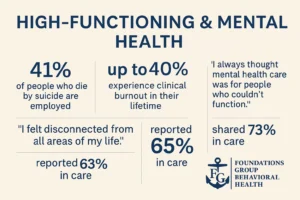You’ve got the calendar. The meetings. The mask.
You show up. You follow through. You check every box—and then a few extras just to make sure. People rely on you. You hold it all together, and from the outside, it looks like everything’s under control.
But when the doors close, you crash.
When the emails stop, your thoughts don’t.
When no one’s watching, you wonder if this is all there is.
That’s where accountability comes in—not as punishment, but as relief. At Foundations Group Behavioral Health, we’ve supported countless high-functioning professionals, caregivers, and creatives across Cape Cod, Barnstable County, and Falmouth who were tired of pretending they were fine.
This isn’t about adding something new to your to-do list. It’s about creating space to actually be okay—not just look like it.
High-Functioning Isn’t the Same as Doing Well
This needs to be said louder: you can hold a job, keep your house clean, and still be falling apart.
Mental health struggles among high-functioning people often go unnoticed because the symptoms are hidden behind success. You’re:
- Showing up to work, but numb inside
- Keeping up with friends, but never really present
- Functioning in every area but feeling disconnected from all of them
In outpatient mental health care, we hear this a lot:
“I didn’t think I qualified for help. I’m not in crisis—I’m just… exhausted all the time.”
But burnout, anxiety, depression—they don’t wait for a visible collapse. They drain you slowly, until you don’t even remember what “rested” feels like.
Accountability Is Not Nagging. It’s Support You Don’t Have to Manage.
Here’s what accountability can look like in outpatient mental health care:
- Weekly therapy sessions that you commit to—even when you don’t feel like it
- A therapist who notices patterns and helps you track what’s actually improving
- Check-ins that feel like anchors, not obligations
It’s not about being watched. It’s about being seen.
One client told us:
“I’m great at showing up for other people. But left to myself? I’ll cancel, delay, disappear. Outpatient made me feel like someone had eyes on me—in a good way.”
That structure doesn’t control you. It gives you something to lean on when your internal motivation is gone.
Outpatient Treatment Can Be Flexible and Effective
If the thought of “mental health treatment” makes you picture something disruptive or dramatic—pause. That’s not what outpatient care looks like at Foundations.
We work with busy professionals, parents, entrepreneurs, and caregivers who need mental health support without stepping out of their lives.
Your treatment plan might include:
- 1:1 therapy once a week, in person or virtual
- Group support for real-life coping (anxiety, boundaries, stress)
- Optional psychiatric consults for clarity (not pressure)
We tailor it around your schedule, energy levels, and needs. And if you’re navigating full days in Barnstable County or Falmouth, MA—we’ll find options that actually work in practice, not just on paper.
Structure Helps You Stay Connected—to Yourself
When you’re high-functioning, your life can feel like a performance. Even when it’s not meant to be. You’re used to showing up, even when you feel hollow. You might even be praised for how well you “hold it together.”
But there’s a cost to that role.
Without structure that’s for you, it’s easy to forget how to check in with yourself. You keep moving. You keep managing. And slowly, you lose touch with what you even need.
Accountability helps slow that slide.
In outpatient mental health care, the consistent touchpoints become mirrors. Not just reflecting what’s going wrong, but reminding you of what’s still working—what’s still you beneath the performance.
You Don’t Need to Crash to Deserve Care
Here’s one of the hardest truths for high-functioning folks to accept:
You don’t have to wait until things fall apart to reach out.
You can be working, parenting, managing—and still need help. In fact, that might be exactly why you need help. Because holding all of it together, all the time, is not a sustainable lifestyle.
One client told us:
“I always thought mental health care was for people who couldn’t function. Then I realized I was functioning instead of living.”
That distinction—between coping and living—is what outpatient care helps uncover.
What Happens When You Actually Start Showing Up (for Yourself)
At first, a lot of high-functioning clients resist accountability. They’re used to managing their own lives. They don’t like being “tracked.” But over time, most of them say the same thing:
“I didn’t realize how much I needed someone to notice when I wasn’t okay.”
With consistency comes change:
- You notice burnout sooner, not just when you’re already fried.
- You learn the difference between your inner critic and actual self-awareness.
- You stop confusing high output with high wellbeing.
It doesn’t happen overnight. But it does happen. And not because someone fixed you—but because someone stood beside you long enough for you to hear your own truth.
FAQs: Outpatient Mental Health for High-Functioning People
What is outpatient mental health care, exactly?
Outpatient mental health care provides regular support (like therapy or group sessions) without requiring you to stay overnight or pause your daily life. It’s designed to work with your schedule.
Can I do outpatient therapy even if I’m not in crisis?
Absolutely. Many high-functioning people seek outpatient care because they want to prevent burnout or manage anxiety and stress before it escalates. You don’t need to hit rock bottom to qualify.
How does accountability actually help?
It helps you follow through—especially on the hard days. Regular sessions and a therapist who tracks your progress keep you engaged, motivated, and supported. It’s not pressure. It’s partnership.
What if I don’t have time?
We get it. That’s why outpatient care is flexible. Many clients choose virtual sessions or schedule around work hours. And once you start, the time you gain in clarity and calm often outweighs the time you invest.
Will I have to take medication?
Not unless it’s something you choose. We offer psychiatric consults, but therapy is always the first line of support. You stay in control of your care plan.
Do you offer outpatient mental health near Barnstable or Falmouth?
Yes. If you’re looking for outpatient mental health in Barnstable County or Falmouth, we have options that include both in-person and virtual services for your convenience.
You don’t have to keep managing alone.
Call 888-685-9730 or visit our Outpatient Mental Health in Cape Cod, MA to learn more about outpatient mental health support. You’re already showing up for everyone else. Maybe it’s time to show up for you.









